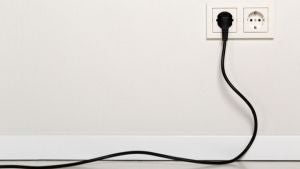A loose wire or broken electrical component can cause a catastrophe at any time, even when you’re not home. The best way to protect yourself and your property from electrical malfunctions is to take the time to ensure all electrical equipment is maintained and handled correctly. In this article on electrical safety, we take you through the rooms and areas of the average home to help point out some of the most common everyday electrical dangers.
Living room and bedrooms
Living rooms and bedrooms share a number of common dangers and, unfortunately, it’s where we’re usually most vulnerable.
Overloaded adaptor
We’ve all probably done this at some point or another. There are so few power points, yet so much needs to be plugged in. So what do we do? We plug in an electrical adaptor and jam everything we can into it. This might seem perfectly fine, but the more wattage passing through an adaptor, the hotter it will get; too much electricity and the adaptor may catch fire.
What you can do: If you’re planning on loading a lot onto an adaptor, it’s in your best interest not to use a poor-quality product. Ideally, you should use adaptors with built-in safety devices to prevent surges. Of course, turn off any power points if you’re not using them.
Faulty cords and wiring
Poor wiring can increase the chance of fire, power surges, arc faults and other serious consequences. Any exposed or damaged cords lying around the home also pose this same risk.
What you can do: Ensure all electrical work is done by an experienced and licensed electrician. Make sure you look after your cables, and ensure they are not being damaged by furniture, pets or anything else. If you’re not using the cable, unplug it and put it away somewhere safe.

Lightbulbs
Yes, that’s right – the humble lightbulb poses a threat to your home if not used properly. Lamps, for example, provide recommended bulb wattage specifications, requiring users to install a bulb with wattage of equal or lesser value. If you install bulbs with a wattage capacity way beyond that of the lamp, the lamp could set fire in certain circumstances.
What you can do: Make sure you check the wattage values on anything that needs a bulb and find the closest match you can. It’s uncommon for most modern bulbs to react like this, but it’s best to play it safe. Make sure you’ve got energy efficient bulbs installed, too, to make sure you’re saving on power. Check out the table below for Canstar’s ratings of the electricity providers that offer the best customer satisfaction and value for money:
Canstar Blue’s latest review of NZ power companies compares them on customer satisfaction. The table below is an abridged version of our full results, available here.
^ By clicking on a brand or 'details' button, you will leave Canstar Blue and be taken to either a product provider website or a Canstar Blue NZ brand page. You agree that Canstar Blue NZ’s terms and conditions apply (without limitation) to your use of this service,to any referral to a product provider from our website, and any transaction that follows. Canstar Blue may earn a fee for referrals from its website tables, and from sponsorship (advertising) of certain products. Payment of sponsorship fees does not influence the star rating that Canstar Blue awards to a sponsored product. Fees payable by product providers for referrals and sponsorship may vary between providers, website position, and revenue model. Sponsorship fees may be higher than referral fees. Sponsored products are clearly disclosed as such on website pages. They may appear in a number of areas of the website such as in comparison tables, on hub pages and in articles. Sponsored products may be displayed in a fixed position in a table, regardless of the product’s rating, price or other attributes. The table position of a sponsored product does not indicate any ranking, rating or endorsement by Canstar Blue. See How we are funded for further details.
Canstar Blue NZ Research finalised in April 2023, published in June 2023.
See Our Ratings Methodology
Curtains
If you have curtains, make sure they are not dangling near any power points. If the power point faults, there is a risk your curtains will catch fire.
What you can do: Simply keep curtains away from power points – just in case. If this is difficult, consider alternatives, such as blinds.
Air conditioners
A dusty air conditioner can be a huge fire hazard. Dust is very flammable, and if it settles on the electrical components of your air conditioner, it may ignite and damage your entire system and perhaps your home.
What you can do: Clean out your air conditioner regularly. The more you use it, the more often it needs cleaning.
Bathroom
The bathroom has historically been responsible for many cases of electrocution. Innovations in electrical safety have seen a fall in fatal electrocutions, but it remains a real threat area.
Water and electricity don’t mix
When you’re in the bathroom, always take extra precautions to keep electrical items, such as hair dryers, away from the bathtub, basin or shower. If water comes in contact with a strong electrical current, the water will become charged, potentially electrocuting you. Additionally, wet skin reduces the body’s resistance to electricity, increasing the risk even more. Small, battery powered items, like phones and electric toothbrushes, are unlikely to create a risk of electrocution, though in the interest of preserving your electronics, it’s ideal to keep them dry.
What you can do: It may seem obvious, but keep your appliances away from water. If you are using an electrical item, ensure to switch it off and unplug it when you’re not using it. And double check for puddles of water before putting your appliance down.

Kitchen
The kitchen is widely regarded as the most dangerous room in the house, and for good reason. As well as flammable oils and sharp utensils, there are a string of electrical hazards that can put you and your home at risk.
Electrical appliances
Fridges, kettles, dishwashers, microwaves – they all pose a risk to you and your home if their electrical components are not properly cared for. Small technical faults with the appliances themselves can also lead to catastrophe.
What you can do: Ensure cables are not taking the weight of appliances (i.e. the fridge) and give your appliances adequate breathing space so they don’t overheat. If an appliance repeatedly trips your circuit breaker, then it’s time to throw it out. Additionally, keep your eyes out for any product recalls – they are more common than you might think.

Roofs and ceiling spaces
Is your roof leaking? Or perhaps you think a possum is causing trouble in your roof space. Your first response might be to grab a ladder and head on up, but wait! The roof area is riddled with electrical dangers.
Roof
Unfortunately, many people still forget to check for live power lines before they commence work. The power lines feeding electricity to your house have a high wattage and can seriously injure or kill you if you make contact with them.
What you can do: Before even grabbing the ladder, find the electrical cables feeding into your house so you know where to avoid. It’s recommended not to go within two metres of the cable to avoid accidentally bumping into it.
Ceiling space
All the electricity fed into your house must pass through the ceiling space, creating a risk of electrocution. This danger is exacerbated by the confined space and lack of light.
What you can do: Before commencing any work in the ceiling space, it’s recommended you turn off the power from the main switchboard. Let anybody else know the power is off so it won’t be turned back on while you’re in the roof.
Solar panel inverter leads:
Inverter leads from solar panels run from the roof and often inside the ceiling space. Though these often don’t carry as much electricity as live wires, they can still cause physical injury.
What you can do: Unfortunately, there is no safe or legal way to disconnect solar panels without training. The cables are usually quite easy to avoid, so just keep your eye out for them.
Insulation:
Insulation can be quite flammable, so it’s important to keep it away from all electrical fittings.
What you can do: When you have finished your work in the ceiling space, double check that you haven’t knocked insulation over any wires or electrical equipment. It is quite easy to do without noticing, so it’s worth checking.
Outdoor area
The outdoor area is subject to the elements, so extra precautions should be taken when using electrical equipment outside.
Rain
Electrical equipment should never be left in the rain, even if it’s not live at the time. Not only will this damage your property, but it can result in electrocution. For example, if your electric mower has a pool of rain water stored inside it when you turn it on, it will likely expel the charge through the mower, potentially causing you injury.
What you can do: If possible, store all your cables and equipment in a garage or shed when you’re not using them. If you’re unable to get them inside when it rains, give the equipment a day or so to completely dry off before using it again.

Pets
If you have electrical cables running across the yard, keep an eye on your pet. Fortunately, most animals are smart enough not to chew your cords, but an inquisitive puppy might let its curiosity get the better of them.
What you can do: Don’t leave your pets in the yard with live cables unsupervised, especially if your pet isn’t too bright.
What to do in an emergency
In the case of severe electrocution or fire, call 111. In the event of an electrical fire, do not add water as this will only fuel the flame. If you’re unsure if something poses a danger, it’s always best to play it safe. Electricity is a wonderful thing, just so long as we are careful.
Compare electricity providers for free with Canstar!
Enjoy reading this article?
You can like us on Facebook and get social, or sign up to receive more news like this straight to your inbox.
By subscribing you agree to the Canstar Privacy Policy


Share this article